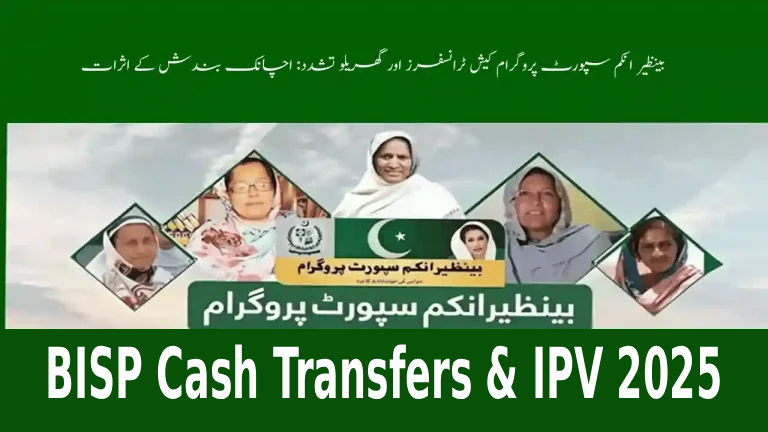
Introduction:
The sudden discontinuation of BISP cash transfers in 2025 has sparked concern across Pakistan, especially due to its potentially profound effects on intimate partner violence (IPV). BISP cash transfers have long played a critical role not only in alleviating poverty but also in reducing IPV by easing financial stress within vulnerable households. Understanding the impact of stopping these transfers abruptly is vital for policymakers, families, and social advocates aiming to safeguard both economic and social well-being.
What are BISP Cash Transfers?
The Benazir Income Support Program (BISP) is Pakistan’s flagship social safety net initiative launched in 2008 to provide unconditional cash assistance to millions of low-income families, primarily focusing on empowering women. The cash transfers aim to cushion the economic hardships faced by poor households, offering financial relief that recipients can allocate based on urgent needs such as food, healthcare, and education. Over the years, BISP has evolved into a crucial poverty alleviation mechanism with notable social impacts.
Link Between BISP Cash Transfers and Intimate Partner Violence (IPV)
Research consistently shows that BISP cash transfers contribute significantly to reducing IPV. By easing financial burdens, these transfers help reduce household stress that often triggers domestic conflicts. The empowerment of women through direct control over funds strengthens their decision-making power and social standing within families and communities. With less financial strain, families experience fewer arguments, improved communication, and healthier household dynamics, all of which lower the risk of IPV.
Why Sudden Discontinuation in 2025 is a Concern
The sudden halt of BISP cash transfers poses risks far beyond economic hardship. Abrupt withdrawal can lead to increased financial insecurity, escalating tensions at home and heightening the vulnerability of women to IPV. The absence of this safety net removes a critical stabilizing factor that helps reduce conflicts rooted in scarcity and need. Families that relied heavily on this assistance may face immediate setbacks in living standards and social cohesion, potentially reversing years of progress made in IPV reduction.
Economic Implications of Stopping BISP Transfers
BISP transfers contributed modestly but meaningfully to household consumption, helping sustain basic needs. Despite criticisms that the amount may not be sufficient for significant poverty reduction, the cash provides an essential buffer that prevents falling deeper into poverty cycles. The sudden removal disrupts this financial stability, risking increased poverty, food insecurity, and challenges in health and education expenditures for many families.
Social and Gender Empowerment Effects
The program’s unique approach of transferring cash directly to women has also been a vital tool for gender empowerment in Pakistan. Women recipients gain financial autonomy, enhanced social respect, and a greater voice in family matters. Removing this empowerment tool risks weakening women’s negotiating power and social status, which could inadvertently increase domestic violence cases and diminish women’s overall well-being.
Recommendations for Policymakers
Given the consequences of sudden discontinuation, it is crucial for policymakers to consider a gradual phase-out or scaling down coupled with alternative support mechanisms. Transition strategies should include:
- Introducing conditional cash transfers linked to health and education to improve human capital.
- Strengthening complementary social programs that address the root causes of poverty and IPV.
- Ensuring continuous engagement with community stakeholders to monitor and mitigate risks.
- Promoting economic empowerment initiatives that provide sustainable income sources for affected families.
Lessons from Past Research and Future Directions
Research reveals that while BISP cash transfers have limitations in poverty eradication, their role in social protection and IPV reduction is undeniable. The program highlights the need for a multidimensional approach combining financial aid with social and gender interventions. Moving forward, Pakistan’s social protection policies must innovate to maintain support for vulnerable populations while addressing systemic challenges.
FAQs on BISP Cash Transfers & IPV 2025
Q1: What is the main purpose of BISP cash transfers?
BISP cash transfers aim to provide unconditional financial support to poor and vulnerable families in Pakistan, focusing on consumption smoothing and poverty alleviation.
Q2: How do BISP cash transfers reduce intimate partner violence?
By easing financial stress and empowering women financially, BISP cash transfers help reduce conflicts within households, thereby lowering the instances of intimate partner violence.
Q3: What are the effects of suddenly stopping BISP transfers in 2025?
Sudden discontinuation risks increasing poverty, financial insecurity, and intimate partner violence due to heightened household stress and loss of women’s empowerment.
Q4: Are there any alternatives to BISP’s unconditional cash transfers?
Yes, conditional cash transfers linked to education and health, along with economic empowerment programs, are recommended alternatives to improve long-term outcomes.
Q5: How important is women’s empowerment in the context of BISP?
Women’s empowerment through direct cash receipt is crucial as it enhances their decision-making power and social status, reducing vulnerability to IPV and promoting family well-being.
Conclusion:
The BISP cash transfers & IPV 2025 scenario underscores the deep interconnection between financial assistance and social stability. The sudden discontinuation of BISP payments threatens to reverse gains made in reducing intimate partner violence by removing a critical financial buffer and empowerment tool for vulnerable women. Policymakers must approach the transition with careful planning, introducing alternative measures that promote sustainable economic and social resilience. BISP’s impact extends well beyond cash transfers, marking it as an essential pillar in Pakistan’s fight against poverty and domestic violence.
